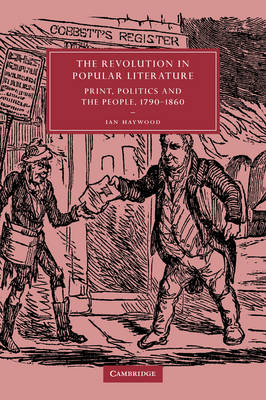Cambridge Studies in Nineteenth-Century Literature and Culture
1 total work
This book takes a new look at the evolution of popular literature in Britain in the Romantic and Victorian periods. Ian Haywood argues that developments in the history of popular literature emerged from its intersection with radical and reactionary politics of the time. Both sides wanted to win the heart and mind of the 'common reader' and used books to try to influence a newly literate group in society. Making use of a wide range of archival and primary sources, he argues that radical politics played a decisive role in the transformation of popular literature from the plebeian miscellany of the 1790s to the mass-circulation fiction and popular journalism of the 1840s. By charting the key moments in the history of 'cheap' literature, the book casts light on the many neglected popular genres and texts: the 'pig's meat' anthology, the female-authored didactic tale, and Chartist fiction.
